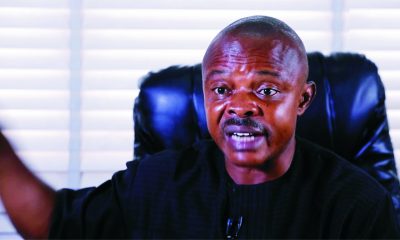Features
Nigeria Versus Iran: Who Wins?
Tuesday, October 26, 2010 was somewhat ‘turbulent’ in Nigeria’s relations with Iran. It was the day that witnessed the discovery of rockets, grenades and explosives in thirteen (13) containers surreptitiously shipped to Nigeria from Iran, and impounded at the Apapa port in Lagos. This discovery has placed the nation’s security apparatus and para military agencies on their toes and on ‘red alert’.
Reactions within and outside the shores of Nigeria had trailed the discovery, as expected. But while investigation continues, Nigeria’s Foreign Affairs Minister, Mr. Odein Ajumogobia met with its Iranian counterpart and the Iranian Embassy in Abuja. Not satisfied with the outcome of the meetings and not ready to take chances, Nigeria opted to report Iran to the United Nations on Monday, November 15.
For Ajumogobia, this is another litmus test on his ability to manage Nigeria’s relations with Iran in the midst of controversy and heightened suspicion. How far can he get the United Nations (UN) on the side of Nigeria in the ragging controversy – given the high-level diplomacy and lobbying such matters of global magnitude involves?
Coming on the heels of his earlier appearance before the UN to defend a policy and decision of the Nigerian government on arms importation and ensure the world sees Nigeria in good light, this current challenge is indeed a litmus test for the Foreign Affairs Ministry, under Ajumogobia. Will Nigeria win Iran at the United Nations or will Iran maneuver her way and emerge ‘stainless’ at the end of the day? Nigeria indeed, depends largely on her Foreign Ministry’s expertise in international relations to record a ‘heart trick’ over Iran, notwithstanding Iran’s face-off with the global body over her ‘nuclear power’ status .
It will be recalled that Ajumogobia was at the UN on Friday, July 16, 2010 to defend Nigerian government’s policy on the review of the 376 bilateral agreements the nation had with other nations. The Rivers State-born Senior Advocate of Nigeria (SAN) rose in stout defence of the decision of the Federal Executive Council (FEC) at the UN, when he told the world-body that the review was not in the context of unilaterally changing the terms of the agreement but in ensuring that they were operational.
He had told the UN, “Nigeria has different ministries, departments and agencies of government that have entered into hundreds of bilateral agreements across the world. A significant number of these have become moribund, in that neither Nigeria nor the other countries have taken any interest in implementation. So the FEC has set up a committee to review all the agreements.” He added that, “the Minister of National Planning conferred with me and undertook to review all these agreements”.
Before Ajumogobia took Iran to the UN, he made it lucidly clear at the press briefing in Abuja on Friday, November 12 that Nigeria was not shadow-chasing but had facts to back-up her position that the weapons emanated from the Middle East country.
Ajumogobia was assertive and emphatic that “the consignments did originate from Iran. That has been confirmed from our own shipping documents and the Iranian authorities. The consignee was a Nigerian, the shipping document showed the notifying party as a Nigerian, one Abbas Usman. He also goes by another name, so that is part of the investigation. The goods were being shipped to an address in Wuse in Abuja.
“The shipping agent was contacted and the goods were cleared from the port and stored in a bonded warehouse in Lagos and this was back in July / August of this year. It was in the course of the goods being moved from the bonded warehouse back to the ports for shipment out of Nigeria that they were intercepted” he said.
Ajumogobia argued that at that point, “another set of shipping documents appeared and the individuals who were connected to the shipment suggested that these goods were being trans-shipped through Nigeria to the Gambia, that aspect of the investigation has not been concluded. One of the individuals connected to this shipment is an Iranian national who, we understand from security reports, took refuge in the Iranian embassy.
“I am pleased to advise that following my very productive meeting with Iranian Foreign Minister, Dr. Manouchehr Mutaki last night, he immediately directed that access be given to our security agents to interview this individual on the circumstances of the shipment, its destination and why we had a Nigerian consignee. The Iranian national applied for a visa to enter Nigeria and there is correspondence that shows he was connected with the Nigerian importer and that is why the security agencies have been anxious to speak with him”, he added.
The name of the Iranian national connected with the shipment (who took refuge at the Iranian embassy in Abuja) is given as Azimi Agajany, and Ajumogobia confirmed that the Iranian government officially accepted that the secret shipment of the high caliber weapons actually originated from Iran even though Iran claimed the consignments were on transit to Gambia and not meant for Nigeria or the Gaza Strip (as claimed by Israel).
It is already clear at this stage that prior to the shipment of the consignment, Agajany, the Iranian point-man of the shipment initially displayed a lack of knowledge about Nigeria’s geography as he wanted the consignments shipped to Abuja. When confronted with the fact that Abuja has no port and that the city lies hundreds of kilometers from the coast, he opted for Lagos as the destination of the shipment.
Equally intriguing in this whole bazaar episode of arms shipment is the resolve of Agajany and his collaborators to conceal the actual contents of the 13 containers in absolute secrecy, raising questions as to what their real motive was.
According to reports, the containers containing the arms were declared as building materials and discharged from the “CMA CGM Everest” vessel (at the ever busy Apapa port). The Controller-General of Nigeria Customs Services, Alhaji Dikko Abdullahi was quoted as saying that “754 packages of glass wool and stones were declared on the ship’s manifest as contents of the 13 containers”.
Also, at the time, the shipment in question was booked as a ‘shippers owned container’ and supplied loaded, and sealed by the shipper (Agajany), described as “an Iranian trader who does not appear on any forbidden persons listing”.
Even the CMA CGM company was emphatic that the arms originated from Iran. The France-based company which operates the Marshall Islands – flagged vessel confessed that the containers were loaded in Bandar Abbas by a ‘local trader’, at the southern port city of Iran, and discharged in Lagos in July and after three months, were meant to be reloaded and sent to the Gambia. The firm said, clearance had been obtained before customs officials intervened and halted the shipment.
Investigations show that there is overwhelming evidence linking Iran with the shipment. Now that the matter is in the court of the UN, under the watchful eyes of the global body’s sanctions committee – which is expected to superintend in the matter, it is expected that UN will condemn Iran, and possibly further sanction her for the arms shipment.
To achieve this, many people believe that Ajumugobia needs to draw the UN’s attention to the views of some diplomats in New York that Iran would appear to be in breach of the United Nations sanctions regime, which forbids it from exporting any kind of weapons directly or indirectly, if the seized weapons were originally loaded on its territory.
As Nigerians, and indeed the world at large, await the outcome of the UN Sanctions Committee’s findings on the report lodged by Ajumugobia, the Nigeria Customs Service that blew the lid open on the arms shipment, the State Security Service (SSS), the Nigerian Army, Nigeria Ports Authority, Nigerian Air Force and National drug Law Enforcement Agency that were at the scene of the discovery on Tuesday, October 26, need to intensity their search for more discoveries, especially to ascertain if similar weapons had found their way through the port into the hinterland, especially as preparations for Nigeria’s 2011 general elections gather momentum by the day amidst animosity-cum-uncertainty.
Justus Awaji, Abuja
Features
Vocational Education And Nigeria’s Economy
The importance of vocational training to the development of any nation cannot be over emphasised. Technical education experts define vocational education as any form of educational program or course that focuses on teaching the specific skills and knowledge required for a particular job or trade. Unlike traditional academic education, which is often broader and theoretical, vocational training is practical, hands-on, and tailored to prepare individuals for specific careers or industries. They also argue that the dearth of trained vocational and middle-level technical manpower represents a very serious gap in the development of third-world countries, including Nigeria. This argument, perhaps, underscores the Federal Government’s bold move towards educational reforms in Nigeria which includes the inculcation of vocational education into the schools curriculum as a way of equipping students with practical skills and enhancing their employability.
A recent statement released by the National Orientation Agency (NOA), indicated that the government has added 15 vocational subjects to the Basic Education curriculum. These additions which take effect from January, 2025, they said, are designed to promote hands-on learning and better prepare students for the job market. The new subjects include: Plumbing, tiling and floor works, POP installation, Event decoration and management, Bakery and Confectionery, Hairstyling, Makeup, Interior Design, GSM Repairs, Satellite/TV Antenna Installation. Others are: CCTV and intercom installation and maintenance, solar installation and maintenance, garment making, agriculture and processing, which covers crop production, beekeeping, horticulture, and livestock farming (e.g., poultry and rabbit rearing) and Basic Digital Literacy, incorporating IT and robotics.
The former Minister of Education, Prof Tahir Mamman, who earlier hinted on the new curriculum for basic schools during a meeting with stakeholders in Abuja, last October, said under the new curriculum, pupils in basic schools will be required to acquire at least two skills. According to the former minister, “The idea is that by the time children finish school, they should have at least two skills. Students should be able to finish school with a minimum of two skills so that they can have a very productive life. “The basis for the curriculum is the National Skills Framework, and it has been approved. It’s a very big project; it affects all schools in Nigeria, public and private.“Whether in the public sector or private sector, all schools are going to implement it. So, this is already determined. It doesn’t require anybody’s consent or any institution can depart from it.
Speaking on implementation, the Mamman said, “We do not expect comprehensive, full implementation from January because, when you roll out something new, there’s a lot of preparation that has to take place by the schools, acquiring new things, equipment, and small things that they will need,” adding that plans were underway to ensure teachers were well-equipped for the new curriculum. He also spoke on the benefits of the curriculum, noting that it would rekindle the desire of parents and students to acquire formal education. Hear him, “Some parents do not want to send their children to school. Right now, part of the problem why schooling has become unattractive is because people finish and there’s no change in their lives. “They cannot be employed. They can’t do anything on their own. So, parents question the value of spending money to send their children to school. “Now it’s going to change that game altogether.
And we have seen how these things resonate with parents. When they are successfully implemented, you will see students will want to run to school every morning. Parents want to take their children to school because they are learning practical things while in school.”The Acting Executive Secretary of the Nigerian Educational Research and Development Council, Dr Margret Lawani, had also disclosed during the same event that the newly introduced subjects fell under the vocational and entrepreneurship studies framework, which has been designed to expose pupils to various trades across multiple sectors. In the views of some vocational training experts, the decision to include vocational education into the basic school curriculum is plausible as it comes at a time when the nation’s education system is facing mounting criticism for its inability to adequately prepare students for real-world challenges.
They opined that by introducing vocational training at an early age, Nigeria has an opportunity to bridge the gap between formal education and practical skill acquisition. They however noted that the success of this initiative hinges on thoughtful implementation and sustained support. “The problem of Nigeria has never been a dearth of ideas or policies on how to move the country forward. In the past some educationists came up with the idea of 6-3-3-4 system of education whereby Students would be taught introductory technology and other forms of vocational skills at the junior secondary school level to better equip them for the real world in future. What happened to that brilliant idea? How many schools have well-equipped laboratories and well-trained teachers to handle these technical and vocational subjects? “The idea of setting up technical schools and polytechnics across the country is for them to serve as a grooming ground for young Nigerians in the area of technology.
How has the government, both federal and states, supported these schools to succeed? So, our problem is lack of implementation, fragmented policies and lack of sustenance not lack of ideas”, posited one expert. He advised that for the new curriculum to bear positive fruits, the government must take time to sensitize heads and owners of schools, teachers, parents and pupils of both public and private schools on the importance of the subjects and assist the schools in acquiring the necessary equipment and tools for the smooth running of the curriculum. “These subjects being introduced cannot be taught only theoretically as we are used to in this country. They require regular practical classes which will cost some money. Government, via the ministries of education, must vote out money for these practical classes and be ready to supervise schools to ensure that they are doing the right thing,” he added
Noting the importance of vocational training in today’s Nigeria where the rate of unemployment is high, Mr. Abel Ikiriko, a basic technology teacher in a Private School at Trans Amadi, Port Harcourt, regretted that vocational training is often seen as a last resort for those who fail academically, leading to low enrolment. He said, “I say this because I am a teacher and I know what we see in school every day. When these vocational subjects are introduced, you will see parents who will go to their children’s schools to make trouble because the children are compelled to learn maybe Hairstyling or something like that. Every parent wants their children to be doctors, lawyers, engineers and other professions and never skilled persons because for our society, skilled jobs are for the dullards.” “One of the most pressing issues in our labor market is the skills gap. Employers often struggle to find workers with the right skills, despite high unemployment rates. Yet many youths are not willing to be trained in a vocation. They prefer to search for the unavailable white-collar jobs. So unfortunate,” he continued.
Ikiriko said that the inclusion of vocational training in primary schools has benefits that extend beyond future job prospects. “Hands-on activities help children develop critical thinking, problem-solving, and creativity—skills that are essential in any field. Vocational subjects can also provide an alternative pathway for students who may not excel in traditional academic subjects, ensuring that no child is left behind in the education system. Moreover, these subjects can instill a sense of dignity in manual labor and shift societal perceptions about the value of skilled trades.”He advocated for public awareness campaigns so as to change perceptions about vocational education, and showcase its potential to lead to successful careers. Mrs. Meg Amadi, a mother of three pupils is concerned about the curriculum of the primary schools being overloaded, stressing that that is a potential risk.
According to her, primary school students are at a formative stage of their development, and overloading them with too many subjects could lead to cognitive fatigue. She maintained that careful planning is required to ensure that the new vocational subjects complement rather than compete with core academic learning; that they are seamlessly integrated into the broader curriculum without overwhelming students. To maximize the impact of this initiative, she offered the following suggestions: the government must invest in training and retraining teachers to deliver vocational subjects effectively, collaborating with vocational training institutes and NGOs for better result; government should begin with pilot programs in select schools to identify best practices and address challenges before scaling up nationwide; the private sector should be engaged to provide funding, equipment, and expertise for vocational training in schools.
Nonetheless, some analysts are of the view that the addition of 15 vocational subjects to the basic school curriculum is a visionary step toward transforming the nation’s education system and improving the nation’s economy. they hold that if implemented effectively, the initiative will equip young Nigerians with the skills needed to thrive in a rapidly changing world while fostering a culture of innovation and self-reliance. They said that with collaborative effort, strategic planning, and unwavering commitment from all stakeholders and the right execution, this bold move could serve as a model for other nations seeking to align education with the demands of the 21st century.
Calista Ezeaku
Features
Vocational Education And Nigeria’s Economy
The importance of vocational training to the development of any nation cannot be over emphasised. Technical education experts define vocational education as any form of educational program or course that focuses on teaching the specific skills and knowledge required for a particular job or trade. Unlike traditional academic education, which is often broader and theoretical, vocational training is practical, hands-on, and tailored to prepare individuals for specific careers or industries. They also argue that the dearth of trained vocational and middle-level technical manpower represents a very serious gap in the development of third-world countries, including Nigeria. This argument, perhaps, underscores the Federal Government’s bold move towards educational reforms in Nigeria which includes the inculcation of vocational education into the schools curriculum as a way of equipping students with practical skills and enhancing their employability.
A recent statement released by the National Orientation Agency (NOA), indicated that the government has added 15 vocational subjects to the Basic Education curriculum. These additions which take effect from January, 2025, they said, are designed to promote hands-on learning and better prepare students for the job market. The new subjects include: Plumbing, tiling and floor works, POP installation, Event decoration and management, Bakery and Confectionery, Hairstyling, Makeup, Interior Design, GSM Repairs, Satellite/TV Antenna Installation. Others are: CCTV and intercom installation and maintenance, solar installation and maintenance, garment making, agriculture and processing, which covers crop production, beekeeping, horticulture, and livestock farming (e.g., poultry and rabbit rearing) and Basic Digital Literacy, incorporating IT and robotics.
The former Minister of Education, Prof Tahir Mamman, who earlier hinted on the new curriculum for basic schools during a meeting with stakeholders in Abuja, last October, said under the new curriculum, pupils in basic schools will be required to acquire at least two skills. According to the former minister, “The idea is that by the time children finish school, they should have at least two skills. Students should be able to finish school with a minimum of two skills so that they can have a very productive life. “The basis for the curriculum is the National Skills Framework, and it has been approved. It’s a very big project; it affects all schools in Nigeria, public and private.“Whether in the public sector or private sector, all schools are going to implement it. So, this is already determined. It doesn’t require anybody’s consent or any institution can depart from it.
Speaking on implementation, the Mamman said, “We do not expect comprehensive, full implementation from January because, when you roll out something new, there’s a lot of preparation that has to take place by the schools, acquiring new things, equipment, and small things that they will need,” adding that plans were underway to ensure teachers were well-equipped for the new curriculum. He also spoke on the benefits of the curriculum, noting that it would rekindle the desire of parents and students to acquire formal education. Hear him, “Some parents do not want to send their children to school. Right now, part of the problem why schooling has become unattractive is because people finish and there’s no change in their lives. “They cannot be employed. They can’t do anything on their own. So, parents question the value of spending money to send their children to school. “Now it’s going to change that game altogether.
And we have seen how these things resonate with parents. When they are successfully implemented, you will see students will want to run to school every morning. Parents want to take their children to school because they are learning practical things while in school.”The Acting Executive Secretary of the Nigerian Educational Research and Development Council, Dr Margret Lawani, had also disclosed during the same event that the newly introduced subjects fell under the vocational and entrepreneurship studies framework, which has been designed to expose pupils to various trades across multiple sectors. In the views of some vocational training experts, the decision to include vocational education into the basic school curriculum is plausible as it comes at a time when the nation’s education system is facing mounting criticism for its inability to adequately prepare students for real-world challenges.
They opined that by introducing vocational training at an early age, Nigeria has an opportunity to bridge the gap between formal education and practical skill acquisition. They however noted that the success of this initiative hinges on thoughtful implementation and sustained support. “The problem of Nigeria has never been a dearth of ideas or policies on how to move the country forward. In the past some educationists came up with the idea of 6-3-3-4 system of education whereby Students would be taught introductory technology and other forms of vocational skills at the junior secondary school level to better equip them for the real world in future. What happened to that brilliant idea? How many schools have well-equipped laboratories and well-trained teachers to handle these technical and vocational subjects? “The idea of setting up technical schools and polytechnics across the country is for them to serve as a grooming ground for young Nigerians in the area of technology.
How has the government, both federal and states, supported these schools to succeed? So, our problem is lack of implementation, fragmented policies and lack of sustenance not lack of ideas”, posited one expert. He advised that for the new curriculum to bear positive fruits, the government must take time to sensitize heads and owners of schools, teachers, parents and pupils of both public and private schools on the importance of the subjects and assist the schools in acquiring the necessary equipment and tools for the smooth running of the curriculum. “These subjects being introduced cannot be taught only theoretically as we are used to in this country. They require regular practical classes which will cost some money. Government, via the ministries of education, must vote out money for these practical classes and be ready to supervise schools to ensure that they are doing the right thing,” he added
Noting the importance of vocational training in today’s Nigeria where the rate of unemployment is high, Mr. Abel Ikiriko, a basic technology teacher in a Private School at Trans Amadi, Port Harcourt, regretted that vocational training is often seen as a last resort for those who fail academically, leading to low enrolment. He said, “I say this because I am a teacher and I know what we see in school every day. When these vocational subjects are introduced, you will see parents who will go to their children’s schools to make trouble because the children are compelled to learn maybe Hairstyling or something like that. Every parent wants their children to be doctors, lawyers, engineers and other professions and never skilled persons because for our society, skilled jobs are for the dullards.” “One of the most pressing issues in our labor market is the skills gap. Employers often struggle to find workers with the right skills, despite high unemployment rates. Yet many youths are not willing to be trained in a vocation. They prefer to search for the unavailable white-collar jobs. So unfortunate,” he continued.
Ikiriko said that the inclusion of vocational training in primary schools has benefits that extend beyond future job prospects. “Hands-on activities help children develop critical thinking, problem-solving, and creativity—skills that are essential in any field. Vocational subjects can also provide an alternative pathway for students who may not excel in traditional academic subjects, ensuring that no child is left behind in the education system. Moreover, these subjects can instill a sense of dignity in manual labor and shift societal perceptions about the value of skilled trades.”He advocated for public awareness campaigns so as to change perceptions about vocational education, and showcase its potential to lead to successful careers. Mrs. Meg Amadi, a mother of three pupils is concerned about the curriculum of the primary schools being overloaded, stressing that that is a potential risk.
According to her, primary school students are at a formative stage of their development, and overloading them with too many subjects could lead to cognitive fatigue. She maintained that careful planning is required to ensure that the new vocational subjects complement rather than compete with core academic learning; that they are seamlessly integrated into the broader curriculum without overwhelming students. To maximize the impact of this initiative, she offered the following suggestions: the government must invest in training and retraining teachers to deliver vocational subjects effectively, collaborating with vocational training institutes and NGOs for better result; government should begin with pilot programs in select schools to identify best practices and address challenges before scaling up nationwide; the private sector should be engaged to provide funding, equipment, and expertise for vocational training in schools.
Nonetheless, some analysts are of the view that the addition of 15 vocational subjects to the basic school curriculum is a visionary step toward transforming the nation’s education system and improving the nation’s economy. they hold that if implemented effectively, the initiative will equip young Nigerians with the skills needed to thrive in a rapidly changing world while fostering a culture of innovation and self-reliance. They said that with collaborative effort, strategic planning, and unwavering commitment from all stakeholders and the right execution, this bold move could serve as a model for other nations seeking to align education with the demands of the 21st century.
Calista Ezeaku
Features
A Farewell To Arms In Ogoni
For three decades or more, there has been a cessation of oil production activities in Ogoni land. But recent meeting of President Bola Tinubu with notable sons and groups may return Ogoni to renewed oil-production once again. Ogonis are weary of perennial neglect. Days after the meeting, President Tinubu gave a nod to the establishment of a University of Environmental Technology in Tai in the Ogoni area. He had earlier-on approved appointments into some federal boards in which some notable Ogonis were among the beneficiaries. The President’s actions and speeches so far have indicated good faith and good intentions. This has urged hard-nosed and irrepressible resistant leaders like Attorney Ledum Mitee, one-time President of the Movement for the Survival of Ogoni People (MOSOP), to be in complete agreement with the return to oil production.
He was heard on the news calling on all well- meaning sons and daughters of Ogoniland to accept the offers coming their way. Many Ogonis however, are still doubtful about the President’s intentions. They have said it is all geared towards the Federal Government having access to the rich oil and gas deposits in Ogoni soil. There is also distrust by some who have yet to heal from past injustices inflicted on the land by previous governments in cahoots with the oil majors. Since 1993 when oil production stopped in Ogoni land following intensive protests from the Ogoni people, the Nigerian government and the oil majors stopped reaping from millions of dollars in proceeds from the oil and gas. Lawson Hayford, a veteran journalist, who has reported the Niger Delta for over four decades, particularly the Niger Delta and the Ogoni crisis, said Nigeria has lost revenue amounting to over N30 trillion for the 32 years that oil has not been mined in Ogoni land.
Writing in the Southern Examiner, Hayford said, “While oil exploration and production in the Niger Delta region began in the late 1950s, operations were suspended in Ogoniland in the early 1990s due to disruptions from local public unrests with oil fields and installations remaining largely dormant for about 34 years, leading to a loss of revenue of over N30 trillion. “There are a total of 96 oil wells connected to five flow stations across the four local government areas of Khana, Gokana, Tai, and Eleme in Ogoniland. They were being operated by the Shell Petroleum Development Company, SPDC of Nigeria, a subsidiary of the Royal Dutch Shell.” That story is presently being rewritten by the remediation efforts of the Hydrocarbon Pollution Remediation Project (HYPREP) and the work of Prof Nenibarini Zabbey, its Project Coordinator.
“Over 50 communities are now enjoying potable water.” As though this was not magic enough, contractors are working hard toward mangrove regeneration not to leave out empowerment programmes for women and people with disabilities. These are stories too good to be true. In addition, the Petroleum Industry Act has also been introduced to take care of some basic needs of the oil communities, especially by tying development of the communities to the operational budgets of the oil companies. The establishment of a host community development trust as a condition for oil mining license holders regarding community development, may well be the magic wand required to turn things around for the Ogonis. A trying present is most likely to give way to a prosperous future. The future of the land and peoples of oil-bearing communities appear brighter with possibilities within this framework.
Environmentalist and lawyer, Iniro Wills, however, strongly thinks that the community-friendly clause in the PIA is only a tiny drop that cannot quench the thirst of the people’s appetite. Only time will tell. A lot of work needs to be done to bring every party in the Ogoni scenario to the table. Some groups are yet to agree with the return of oil production in Ogoniland, while others do not quite agree with the modus operandi adopted to initiate the process. They would all need to be brought together to ventilate their positions so that everyone is taken along together. Last Saturday, the committee that emerged to kickstart a process of the consultations initiated by President Tinubu convened a meeting at Freed Centre, Bori in the heart of Ogoniland. Though it was well attended, proceedings had to be hurried as a group of protesters stormed the venue.
Blessing Wikina, a long time public communications expert from Ogoni however, noted that the Bori meeting was a good landing. He said he was there. He dismissed the slanted reports about the meeting which he said were done to create social media content. He said in his social media handle that the committee deliberately avoided founding the consultations along old ‘loyalty blocs’ and ‘groups of people with entitlement blood.’ “Every Ogoni was to attend as an individual, not as a member of a camp. This approach meant no one would claim success or failure.”
Several factions exist in Ogoniland, including the leading pressure group, MOSOP, and they all need to get involved in the consultations, including those sulking for not being invited to the Abuja parley with the President.
Factional MOSO President, Fegalo Nsuke, recalled how MOSOP championed the Ogoni struggle from the beginning and wondered why MOSOP was not invited to Abuja or the Bori meeting. Hayford said, “sidelining MOSOP in the move to re-enter Ogoniland for oil and gas production could create distrust in the hearts of the Ogoni people, cautioning against rushing the process in order not to generate tension, anxiety and crisis in the landscape of Ogoni area.” Certain that the current process led by President Tinubu would yield good fruit for the Ogoni, Wikina says, he silently prays that “this oil resumption comes sooner, so that our people will participate in productive ventures around our oil economy…..and get benefits like our brothers in Orashi area, Bonny axis, etc.”
He cast a glance at the Bodo-Bonny road that will link mainland Nigeria with the vital island port of Bonny that is passing through Ogoniland. “Shall we wait, watch, as vehicles drive through here, to where lucrative oil businesses are happening…without our involvement? Every party will have to sheathe their sword and embrace the ongoing consultation process that will lead to a prosperous future for the land and the people.
Dagogo Josiah, Olayinka Coker and Emmanuel Obe
Josiah, Coker and Obe wrote in from Port Harcourt.
-

 News5 days ago
News5 days agoNBA President Sues For Workers’ Protection, Better Wage
-

 News5 days ago
News5 days agoAdeleke Approves N4bn Bond To Clear Pension Arrears
-

 News5 days ago
News5 days agoNDDC Seeks UN’s Support To Accelerate Niger Delta Development
-

 News5 days ago
News5 days ago2025 UTME: JAMB Disowns Site Requesting Payment From Candidates
-

 News5 days ago
News5 days agoMay Day: Labour Seeks Inclusiveness In Policy-making
-

 Niger Delta5 days ago
Niger Delta5 days agoRivers Begins, Supplemental Polio Vaccination, Morrow
-

 Featured5 days ago
Featured5 days agoRSG Commits To Workers’ Welfare …. Calls For Sustained Govt, Labour Partnership
-

 Rivers5 days ago
Rivers5 days agoBook Title “Managing Projects Successfully” Launch In Port Harcourt

